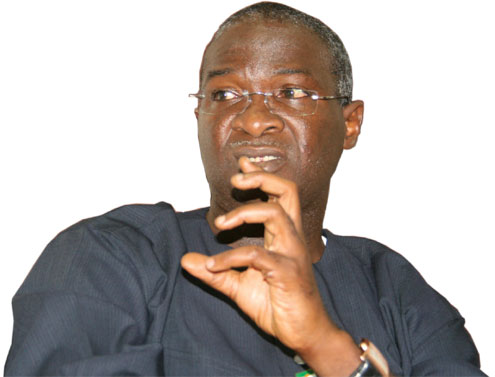The story and records of what the ministry of Power, Works and Housing has done in 3 (three) years, 5 (five) months and 18 (eighteen) days, that is from 11th November 2015 to date, is largely documented in the book we are presenting today.
The book reviewer has already given a preview of what it contains, and I will not dampen your reading enthusiasm by going into any lengthy detail.
I propose only to set a context for evaluation and understanding.
I will start by referring to my inaugural press briefing on 8th December 2015 where I set out the agenda that this ministry would be pursuing so that well-meaning Nigerians who were interested in monitoring us could track us.
In that briefing, I set out what our campaign message of change would mean in this ministry and in respect of the three sectors of this ministry I set out what should be expected of us.
For Power, I said that we will change paltry budget of N5B which we met in 2015 by spending more and I committed to the delivery of incremental power; as our short-term objective.
For Works, I promised that we will increase the paltry budget of N19B, and use the same to revive abandoned road projects, restore construction activities, recover lost construction jobs and reduce journey times on our federal roads.
For Housing, I promised that we will set out to develop a model National Housing Programme, to ascertain what Nigerians find acceptable and affordable as a prelude to a more aggressive roll out of National Housing that we are sure that Nigerians accept and can also afford.
Ladies and Gentlemen, on behalf of my brother ministers, Mustapha Baba Shehuri, Minister of State who started this journey with me, and Suleiman Hassan Zarma, Minister of State who joined in 2017, and who has now been redeployed to head the Ministry of Environment, I feel confident to say that with the help, support and cooperation of our staff, under the leadership of our permanent secretaries and directors, we have delivered on the agenda I set out at the 2015 press briefing.
In the power sector, well-meaning Nigerians acknowledge our efforts by saying clearly that their power supply experience has improved compared to 2015, and we acknowledge that the work has not finished.
The task going forward is to solve the outstanding issues of estimated billing, supply of meters, add more power and make the supply steady which I stated will be our medium-term goal.
In the road sector, there is at least one federal road under construction in each of the 36 states and the FCT; while some have been completed, others are still under construction.
Construction workers will tell you that they have a better deal than in 2015. Quarry operators will tell you that the business of supplying sand, rocks, chippings, laterite and other construction materials is better today than in 2015.
The volumes and quantities of Bitumen and Asphalt being sold has increased compared to 2015. Supervising consultants engaged to monitor our contractors and even banks who issue bank guarantees to secure payment to contractors will tell you that they have a better deal than in 2015.
More importantly the Road Transport operators and their unions and commuters will tell you that their journey times are better, although our work is not finished.
These are some of the reasons why President Muhammadu Buhari was re-elected. To take them to the Next Level and finish the job.
The housing sector has a similar story of economic opportunities with construction going on in 34 states most of which are now largely completed. We are now in the administrative state of setting better conditions for eligibility and offer to the public, while simultaneously planning a second phase in those states that have given us land.
Our intention is to respond sustainably to deliver on the president’s promise to enable more job creation and employment opportunities.
With that general summary, I will highlight some important things in each sector which may not be captured in this book.
POWER
While the whole of Nigeria has focused on power from the grid for 6 (six) decades in the search for a solution to our energy problem, the Buhari government has opened a new page through this ministry about the possibilities that lie in the OFF-GRID sector.
Through this initiative and the Rural Electrification Agency, 7 (seven) universities, 2 (two) teaching hospitals are currently having their own independent power solution deployed at various states.
Preparatory works have been undertaken on all sites. All the equipment have arrived in Nigerian ports and while some have been cleared, others are being attended to.
The solar system and panels for the University in Ebonyi University have been installed and the plant will soon be completed.
Some markets in Lagos, Kano, Aba, Ondo, Ibadan have their own steady supply of power. There will be more of these to come.
6 (six) hydro dams have been recently concessioned to supply power to rural, farming and contiguous communities.
Approvals have also been given to install solar power systems in government offices starting with our ministry, and a disco has offered to buy some of the excess power for its consumers at night when our offices are shut.
Communities like Magboro and Ibafo in Ogun State who have never been connected before now have access after 10 years.
The people of Gora in Karu Local Government of Nassarawa state are another example of the impact of the off-grid policy.
In the works sector, the Ilorin-Jebba road which had collapsed and used to take 3-7 days to traverse 93km is now finished and take a little over one hour to travel.
Maintenance work on bridges, long neglected is being undertaken on assets like 3rdMainland Bridge, Isaac Boro Bridge, Tamburawa Bridge, Eko Bridge, the old Niger Bridge, while new ones like 2nd Niger Bridge, Bodo-Bonny Bridge, Loko-Oweto Bridge, are being constructed and others have been recently awarded.
Apart from public highways, we are repairing, building and rehabilitating internal roads in federal universities and tertiary institutions. This has not happened in a long time.
FERMA, our maintenance agency is now fully focused on her core assignment of road maintenance under a new leadership and management team.
Ladies and Gentlemen, all of these did not happen while oil prices were $100 per barrel. They happened when oil prices dropped below $50 per barrel and at one time below $30.
In the housing sector, FHA is back to its core mandate of building houses and FMBN is more focused on lending to contributors to the National Housing Fund.
We have cleared the backlog of unsigned consent to land transactions and issuance of certificates of transparency.
As at 13th April 2019, we have issued
a) 1,417 consents to land transactions;
b) 2,400 certificates of occupancy.
Some of the beneficiaries have paid for their properties as far back as the 1990s but did not get title.
Very simply, we have made this place better than we met it. That is what our mandate for change meant and still means; making it better.
Going forward, we remain committed to delivering service.
One of our areas of focus will be an aggressive implementation of the National Infrastructure Maintenance Programme recently approved by FEC.
We will start with public buildings especially our offices and secretariats in Abuja and other parts of the country. This our new look Conference Hall is an example of what is possible if we embark on repairs and maintenance.
By repairing toilets, fixing broken doors and items of furniture, replacing electrical fittings, painting buildings and undertaking general repair, we will deliberately be creating jobs for people at the bottom of the pyramid such as masons, carpenters, plumbers, welders, painters and other artisans.
We are also mindful of the global weather changes characterized by extremes of weather such as freezing winter in Europe, extreme heat in the Middle East and extreme rainfall causing flooding.
We have prepared to combat and cope with risks of flooding just as we have always prepared for the Ember months, and just as people in cold regions prepare for winter.
This is a first, from our records, and it requires:
a) Contractors closing up major earth works and keeping flood prone areas motorable during the rainy season;
b) State governments working with us to deflood canals and drains to allow for easy flow of water that traverse their states;
c) TCN and the DisCos have been directed toembark on preventive measures such as trimming of tree branches (not cutting down trees) that can affect electricity cables, tracing lines, connectors and equipment that are loose or fragile and repairing or replacing them ahead of the rains.
Ladies and Gentlemen, this does not mean that rainfall will not cause flooding if it is excessive, or that high winds and thunderstorms will not affected electrical fittings.
What it means is that the Buhari Government is preparing and anticipating rather than reacting after the fact.
I would like to express my appreciation to Mr President, the Vice President, my colleagues in the Cabinet, members of the Legislative and Judicial arms for the support and assistance over the three plus years.
My gratitude also goes to former President Abdulsalami A. Abubakar for graciously contributing the Foreword to the book being presented today.
Our partners in the media deserve no less commendation and appreciation, especially those who undertook long journeys with our team to see for themselves.
Let me conclude by placing on record for today and the future, some of the processes involved in road construction in Nigeria, so that members of the public can understand some of what we do here as a basis for future assessment of performance.
Our mandate is mainly Federal Trunk roads as prescribed by the Constitution. These are roads that connect states and some of the shortest are averagely 50 kilometres and the longest today is 560 kilometres that runs from Kano to Maiduguri.
When a road is identified for construction, it has to be surveyed by land surveyors to identify the right of way, soil tests have to be conducted to determine what is under before a design is commissioned and the owners of the land have to be enumerated for compensation of crops and buildings that have to be removed and paid for, including existing utility assets like electric poles and installations and petroleum and water pipes.
All of these are items of cost in addition to the cost of materials like sand, laterite, cement, labour, iron rod, lubricants and asphalt that will be used to build the road.
When the cost is determined from design and allied costs, it forms part of the budget presented by Mr. President every year.
When the budget is passed and the cost is approved, then we follow procurement process which includes advertising, evaluating tender, submission to the Bureau of Public Procurement to get a Certificate of NoObjection.
After this, depending on the total cost, once it exceeds N500 million, the minister must seek Federal Executive Council (FEC) approval to award the contract.
If successful, the award is made, then legal department draws up a contract which must be signed. After this, the contractor must go to a bank to get an advance payment guarantee in order to get a mobilization fund, not exceeding 15% of the contract sum.
When all of these has been done, we await the release of funds from the Ministry of Finance if they have money. If not, we wait for the approval of the National Assembly for the country’s borrowing plan for the year before Ministry of Finance can go to the market to raise money by loans (local and external), bond issuances or special borrowing like Sukuk. This takes weeks and months.
When money is finally released to the contractor, he begins to place orders with quarry owners to produce laterite, sand, rock and stones; and asks iron rod, cement dealers, and asphalt producers to supply him.
Contractors don’t usually stock these materials. They order them when they are paid and when they run out of money and exhaust their stock, work stops, while they await the next payment cycle.
They also do not keep labour, except their core staff in order to manage their overheads.
They employ labour when there is work to do.
Apart from the tedium of the above process, there are community issues, court cases, civil rights agitations that affect the continuous delivery of construction work.
This is the price of democracy and the assertion of rights where freedoms dominate in a nation that is urgently in need of radical infrastructural renewal and replacement.
While all these are going on, government cycles in the last 20 years have been fixed tenures of 4 years at a time, subject to how the electorate votes.
Personnel changes are effected by retirement, deployment, opportunities and cabinet re-shuffles. As a result, critical directors, permanent secretaries and ministers are turned over in a quest for efficiency.
In all, since 1952 to date, Nigeria has had 34 ministers of works and I am number 34 in a period of 67 years.
This amounts to an average of a Minister every 1.9 years.
A further interrogation of the data of tenure shows that very few of them served for up to 4 years and above and the majority served a little over a year, which is barely enough time to design a road not to talk of undertaking the procurement and actually building the road.
Ladies and gentlemen, these our realities.
While we reflect on what has been done, which is what is partly documented in the book being presented today, careful thoughts and choices lie ahead of us.
The Executive, Legislative and Judicial arms of government as a matter of urgeny now need to forge a national consensus on how to overcome some of the challenges that we face in delivery of our urgently needed national infrastructure.
Thank you very much for attending and for listening.
Babatunde Raji Fashola, SAN
Honourable Minister of Power, Works and Housing
 Hottestgistnaija.com
Hottestgistnaija.com





